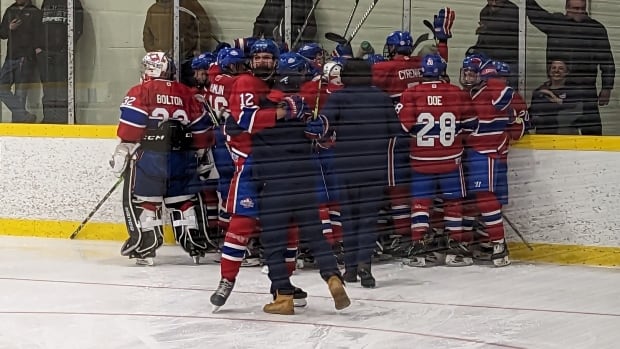
Marco Sladoje has never experienced such a feeling of relief — and the same could likely be said for all of his Lakeshore Canadiens teammates as well as the Wheatley Omstead Sharks.
Exhausted physically and mentally as the clock ticked past 12:30 a.m. Thursday at the Wheatley Area Arena, Sladoje, 19, got the puck on a breakaway and snuck it by Sharks goalie Ethan Handley. That made it 5-4 for Lakeshore, ending the longest game in Provincial Junior Hockey League history and Wheatley’s season.
Lakeshore took the PJHL’s Stobbs Division best-of-seven semifinal 4 games to 2. The 60-team Junior C league has teams in communities across Ontario.
“I was just so relieved. I just put my hands up and put my head up,” Sladoje said of the celebration after the game, which began at 7:27 p.m. on Wednesday and wrapped up at 12:45 a.m. Thursday. “And I just had the team come around me. It was a lot of relief and a lot of excitement as well. The little adrenalin you do have left was still pumping. It was a great moment in my hockey career, for sure.”
You’re looking at 11 periods of gruelling playoff hockey in less than 24 hours. That’s incredible.– Mark Seguin, GM, Lakeshore Canadiens
Sladoje, who’s from Belle River, said he has played in overtime games before, but nothing like this. There are usually three 20-minute regulation periods, but during the playoffs, a tie goes to 20-minute overtime periods until there’s a winner.
To put that in perspective, a typical hockey game (incorporating times when play stops for penalties, offsides, player injury or other reasons) lasts between 90 and 120 minutes. Lakeshore and Wheatley played for over 5 hours.
“It was honestly the most gruelling, I won’t say worst experience. But it was worse than any bag skater or any physical endurance we had to do.” Sladoje said. “I think at one point everyone was taking like 10- to 15-second shifts. Guys were falling all over the place. It was hard. It wasn’t easy, that’s for sure.”
Sladoje joked that at one point, they were wondering how much longer they could keep playing.
“There was a lot of cramping in the legs. But nobody wanted to ice their legs because you don’t want to do that in the middle of a game. There were a lot of guys putting on BioFreeze [pain rub] to keep them going.”
During the intermissions, Sladoje said, the players took in lots of fluids and proteins to keep going.
192 shots later
Canadiens general manager Mark Seguin said because they were on the road, the team began to run out of supplies.
“You don’t factor in eight periods of hockey,” Seguin said. “We bring lots of Gatorade, water, bananas, protein bars and other food for the players. But after 11 p.m., the stores are closed in town. At one point, all we had left was water.”
During Game 6, Canadiens goalie Nicholas Bolton made 96 stops on 100 shots, while Handley stopped 87 of 92 shots.
“What people forget is these two teams played in Lakeshore the night before,” Seguin said. “So you’re looking at 11 periods of gruelling playoff hockey in less than 24 hours. That’s incredible.”